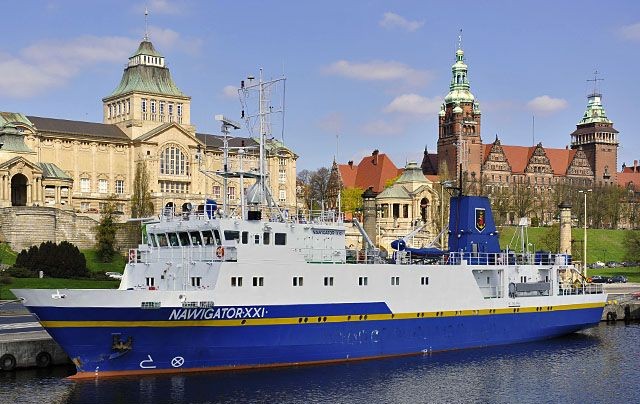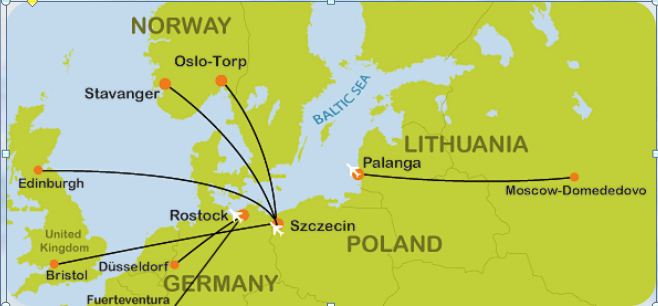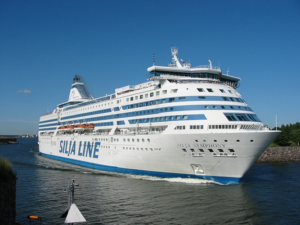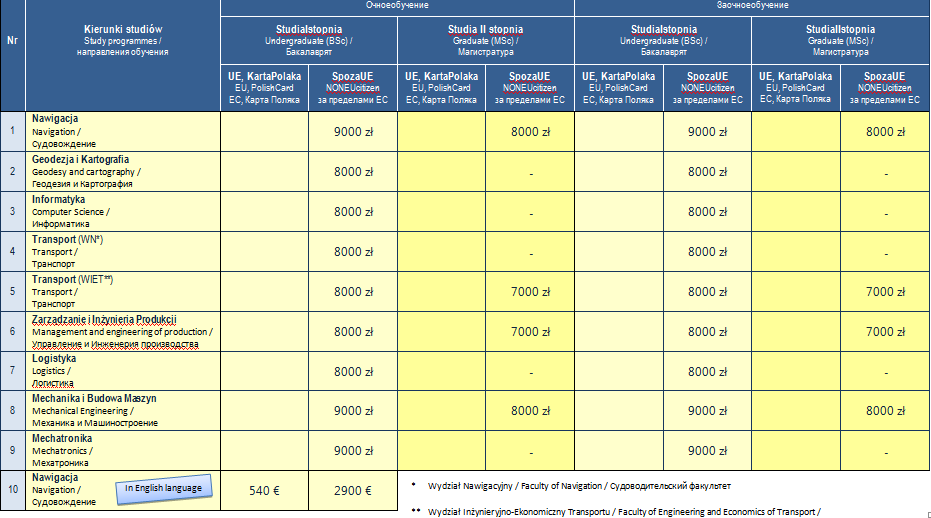About Academy
The Maritime Academy in the city of Shchecin, Republic of Poland, is a university that trains specialists who wish to work successfully at sea and on land. The graduates of the Academy are people who are perfectly prepared for the requirements of the labor market – they speak English well, with modern knowledge.
The Shchecin Maritime Academy trains students in specialties around the world. Three faculties of an educational institution give an opportunity to study bachelors and masters in stationary and correspondence forms of education.
The Maritime Academy is a technical higher educational institution, the beginning of which dates back to the forties of the twentieth century. The Academy carries out its activities independently in accordance with the law on higher education. It is one of the first maritime organizations that implemented a quality management system in accordance with the ISO 9001, series standard, and also received a certificate of conformity training that complies with the requirements of the 1978/1995 STCW Convention issued by the Lloyd’s Maritime Center of the Register of Shipping.
The Academy fulfills 3 major functions – educational, training and research. Training is conducted 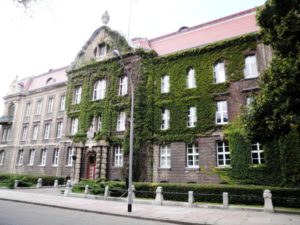 in three faculties, namely: Shipbuilding, Ship Mechanical and Engineering and Economic Faculty
in three faculties, namely: Shipbuilding, Ship Mechanical and Engineering and Economic Faculty
transport in 25 specialties. The Academy conducts two-level full-time and part-time training, in which graduates get comprehensive theoretical knowledge and practical skills, as well as very good knowledge foreign languages. For those who want to get additional qualifications necessary to work on the ship, and also, maritime diplomas are offered special courses and training at the faculty of advanced training for officer personnel and at the marine rescue training center, ending with certificates that are recognized worldwide.
An important object is the development of the Maritime Academy, whose main goal is the organization of the development of scientific personnel, the expansion of the material and didactic base. In addition, the Department organizes and finances the cultural and sports life of the Academy, promotes the achievements of the Academy in the country and abroad, finds sponsors, organizes conferences, exhibitions and demonstrations of the latest technologies related to the marine industry.
This is a chance for you to earn high incomes at a young age..
The quality of education:
The Maritime Academy in Szczecin has certificates of recognition of maritime education units for compliance with the requirements of the educational process of the STCW Convention (Standards of Training, Certification and Watchkeeping), which defines the training requirements for seafarers. This means that graduates of the Academy can get a maritime diploma and work on a ship with the rank of officer anywhere in the world. In addition to this, all the courses (both sea and non-floating) conducted at the Academy were checked by the Polish Accreditation Committee and received a positive assessment.
The university aims to practical training. Students during training are practicing on land and at sea (depending on the direction)
Research activities of the Academy:
Academy research activities affect the development of the Maritime Economy.
Works are performed on the order of shipowners of the marine and fishing fleet, the Ministry of the Navy and government organizations. Many of these works are already being used in practice, ensuring an increase in the economic efficiency of port and fleet operations.
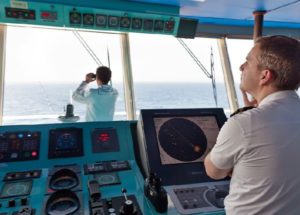 To ensure this activity, the Academy has a modern, constantly growing library. It serves to provide textbooks and teaching aids for cadets, students and employees of the Academy, to quickly obtain foreign literature, articles and collections of local scientific information from abroad. The library is connected to the local computer network of Szczecin, serves as a regional maritime library, has an electronic catalog accessible via the Internet.
To ensure this activity, the Academy has a modern, constantly growing library. It serves to provide textbooks and teaching aids for cadets, students and employees of the Academy, to quickly obtain foreign literature, articles and collections of local scientific information from abroad. The library is connected to the local computer network of Szczecin, serves as a regional maritime library, has an electronic catalog accessible via the Internet.
Teaching Staff
The teaching staff includes 25 professors, 24 doctors of science, 99 candidates of science, including 45 teachers with maritime diplomas (long-distance captains and a senior mechanic officer).
Scientists with extensive experience in practical work and teaching, who have the highest maritime diplomas, guarantee a high level of education and quality free education, as well as ongoing research projects.
Laboratory base
A high level of training at the Maritime Academy is provided by a modern laboratory base, which has 30 laboratories in the navigational and ship-mechanical faculties, including a floating measurement and hydrographic laboratory and a Planetarium, simulators (radar and navigation NMS-90 and QR-303, VTS), as well as same Center for Engineering Marine Movement.
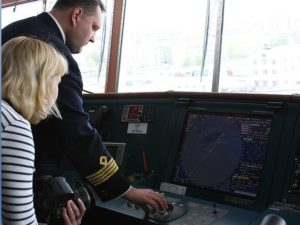 The Academy has its own scientific and educational vessel “Navigator XXI”, on which the cadets are practice. The ship conducts scientific studies on the hydrology of the marine environment, the level of water pollution, navigation accuracy, and engineering of marine traffic.
The Academy has its own scientific and educational vessel “Navigator XXI”, on which the cadets are practice. The ship conducts scientific studies on the hydrology of the marine environment, the level of water pollution, navigation accuracy, and engineering of marine traffic.
Equipped with modern systems, mechanisms and radio navigation devices, the vessel has been providing navigation safety during the Unity Line regattas for 8 years already. The vessel is designed to provide training and research work of the Academy and other institutes. According to independent experts, the vessel with its research equipment is one of the best marine research units in the world, and provides quality free training in Poland.
Traineeships
The main goal is to increase the professional competence of students of transport directions and research. Three forms are provided:
I. TRAINING TRIPS
Trips are carried out in companies: 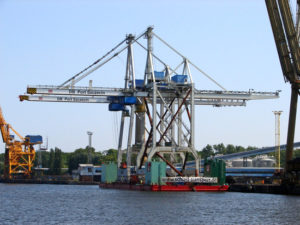 DB Port Szczecin or Bulk Cargo-Port and MONDI. During the visit, students will become familiar with the organization of the production process, the organization of loading and unloading operations and ships in the harbor and get acquainted with the external and internal supply chains in the entire logistics structure of the company. After each visit, students get a certificate of discharge.
DB Port Szczecin or Bulk Cargo-Port and MONDI. During the visit, students will become familiar with the organization of the production process, the organization of loading and unloading operations and ships in the harbor and get acquainted with the external and internal supply chains in the entire logistics structure of the company. After each visit, students get a certificate of discharge.
.
II. SPECIALIST IN TRAINING
To ensure comprehensive support, the project is implemented in specialized training sectors of an internal auditor of a comprehensive management information system, whose graduates are in high demand in the labor market. After completing the course, students receive certificates.
III. TRAINING
The trainees are prepared in collaboration with the staff of the intern trainees and include issues related to the results of training in the areas of transport in teams leading to improved interpersonal skills. For example, students, in addition to acquiring the skills they learn in preparing effective listening, present their opinions in a clear and understandable manner, learning to lead discussions, present arguments, solve problems, and form conclusions.
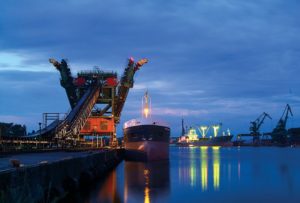 Companies in the TSL industry take part in projects:
Companies in the TSL industry take part in projects:
TSL: DB Port Szczecin, ports of bulk cargo in Svinouysce , Rentrans is a production company of Mondi. These companies are committed to accepting all interns. Internships last from 160 to 480 hours. Between the companies, the Academy and the students is a tripartite pact of agreements.
Paid internships abroad and the attractiveness of training
The project provides internships for students. Each internship will last a month. Students during the internship will work 24 hours a week. Students will be paid a salary of 3000 PLN gross (minus mandatory employer contributions). The internship will be organized during the summer holidays in the second and 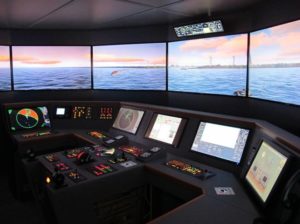 third year of study. The selection of students for participation in a foreign internship will be based on two criteria.
third year of study. The selection of students for participation in a foreign internship will be based on two criteria.
The first criterion is educational. The second criterion is knowledge of the country in which you want to complete an internship or knowledge of the English language. First, those who have the highest average rating for all exams and tests received from the beginning of studies are satisfied with the internship. Knowledge of a foreign language will be verified based on external or internal testing certificates.
Career and income
Graduates of the Maritime Academy have a reliable career path. Leaving for the first voyage as a cadet for practice, students earn 700-1000 euros per month. After studying, having a high school diploma, salary already ranges from 2000-3000 euros / month. After six years, at the age of less than 30 years, you can get a diploma of a sea captain or a senior technician officer and a salary of about 5,000 euros!
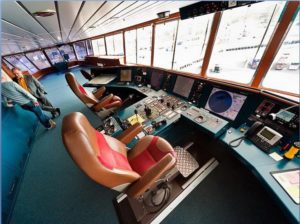 People who want to work on the land, find work in the enterprises of the marine industry and engineering. Specialists of technical supervision and diagnostics, repair of machines, engineers of research laboratories and institutes, specialists in environmental protection at various levels of government, specialists of rebar companies, experts of shipyards and ports, offices of design and institutions of technical supervision, insurers and logistics are highly appreciated.
People who want to work on the land, find work in the enterprises of the marine industry and engineering. Specialists of technical supervision and diagnostics, repair of machines, engineers of research laboratories and institutes, specialists in environmental protection at various levels of government, specialists of rebar companies, experts of shipyards and ports, offices of design and institutions of technical supervision, insurers and logistics are highly appreciated.
LIVING IN HOSTEL
The Maritime Academy has its own student accommodation base – two student dormitories “KORAB” and PASSAT, which are located 300 meters from the central building of the University. Both dormitories are ten-story buildings that have 900 beds for students. The rooms are grouped into so-called boxes: 2 or 4-room consolidated common bathroom, consisting of a shower, toilet and two sinks. Both women and men can live in the same box. The equipment of the student rooms consists of: wardrobes, desks, chairs, food cabinets, shelves and beds (two-storey and separate).
On each floor there is an equipped kitchen with electric stove, kitchen sink and table.
All rooms are installed have the opportunity to use the Internet.
The building has a student laundry with two professional laundry machines and a dryer. For students, there is also a TV room with the Digit + package, a room for training in silence, a billiards room, a deposit – you can also rent ironing boards and irons.
Faculties
Faculty of Navigation
His task is to train highly qualified cadets who meet current and future requirements of the sea transport, fishing and rescue fleet, as well as operational armature services. Sea transportation is and will be the cheapest form of transport and therefore, for many years before you will be a wide choice of jobs in the global labor market.
Faculty of ship mechanics
His task is training for the maintenance and servicing of ship power plants, as well as the repair of mechanical and electrical equipment. As a graduate of the Faculty of Mechanical Engineering, you will become a valuable worker as an Officer Mechanic, a specialist in the technical control services of valves and production facilities. In the global labor market, there is an increase in demand for technical specialists of engineers who are ready to work in the most difficult conditions.
Faculty of Engineering and Economics
His task is the training of personnel for directing and supervising production, as well as those involved in support and expedition (delivery). These skills are necessary when conducting each activity. A modern and enterprising person who wants to occupy a high position in a firm must possess the knowledge acquired at this faculty.
Graduates of the Maritime Academy are responsible people who speak good English and have modern technical knowledge
– The Maritime Academy is an institution of higher education, the graduation of which gives a European diploma opens the door to any company in the world!
– graduate a diploma of European standard of an engineer or master’s engineer.
– The Academy trains not sailors, but a management ship crew. Sailor can go swimming after the first year of training. The salary, for example, of a ship mechanical engineer is about 3,000 euros per month. At the same time, vacation, when the seaman is on land, is also paid.
– Shipowners in the course of training conclude an agreement on further employment of graduates of the Academy on their ships. Upon signing such a contract, the student get a scholarship from the shipowner.
– In addition, a scholarship of 400-600 zł per month can be obtained for successful training
– During the study, the student has free medical care.
– The cost of the student with the calculation for the month: the fee for the hostel – about 100 dollars / month, food – 100 dollars / month.
-The cost of education for foreigners who do not have Polish roots: all “sea” specialties – 9000 zł / year (2100 euro / year), not “sea” specialties – 8000 zł / year (1900 euro / year.). LEARN DETAILS:
IMPORTANT! The possibility of free training at the Maritime Academy in Shchecin, Poland.
We want to provide you with a new direction of study in the Shchecin Marine Academy – the direction of ocean technology.
OCEANTECHNIC — allows Ukrainians to study for FREE!! More details:
– Foreigners who have a Sentry Card with the annotation “Approved to the labor market”, or foreigners who have a Schengen Visa, or foreigners who have a Visa for the purpose of employment in Poland – can be accepted for training exclusively on a fee basis.
Экскурсия по щецинской академии:
Обязательно посмотрите эти видео:
Вы поймете, что поступать на учебу в Польше нужно только в Щецине.
Во-первых, здесь нет конкурсов, огромный выбор специальностей, гарантия трудоустройства и построения карьеры.
Юлия, студентка Морской Академии г. Щецина:
о поступлении, обучении, практике и др. важных моментах:
Обучение в Академии, сложно ли учиться в Щецинской Морской Академии?
Совмещать работу с учебой? Трудоустройство после обучения, набор на работу от работодателей; карта побыту, вид на жительство.
Widget not in any sidebars
Navigation Faculty
Candidates for admission are accepted to the direction, and the opportunity to choose a specialty of education will appear in the second year of study.
Day departments of the first degree (engineering)
DIRECTION: SHIPPING:
4 years of study in the field of:
– sea transport (TM)
– sea fishing (PM)
– marine traffic engineering (IRM)
– hydrography and navigation (PHiON)
– Maritime Rescue Service (RAT)
– Marine Information Systems (MSI)
– operation of floating units (offshore) (OFF)
– sea and river transport (TMiŚ)
– marine mining technology (GM)
DIRECTION: TRANSPORT:
3.5-year training in the field of:
– Maritime Transport Safety Engineering (IBTM)
– navigation technologies and systems (TiSN)
DIRECTION: GEODESY AND CARTOGRAPHY:
3.5-year training in the specialty:
– geoinformatics (G)
DIRECTION: INFORMATICS
3.5-year training in the specialty:
– Marine Informatics (IM)
Day department of the second degree (master’s)
DIRECTION: SHIPPING
1.5-year training in the specialty:
– sea transport (TM)
First degree correspondence (engineering)
DIRECTION: SHIPPING
4 years of study in the field of:
– sea transport (TM)
DIRECTION: GEODESY AND CARTOGRAPHY
3.5-year training in the specialty:
– geoinformatics
(G) DIRECTION: INFORMATICS
3.5-year training in the specialty:
– Marine Informatics (IM)
Correspondence offices of the second degree (master’s)
DIRECTION: SHIPPING
2-year specialties:
– sea transport (TM)
– sea transport (training in English) (TM)
What can you do as a graduate of the Navigation Faculty?
Destination navigation
The aim of education in the direction of navigation is to provide students with a wide basis of scientific knowledge and other branches of science that influence the elasticity of their career choices. The education program covers maritime and land professional practices as well as specialist courses. Graduates are prepared for the work of deck officers on sea and river vessels in enterprises associated with water transport.
They can be employed in services and merchant fleets with a high degree of specialization, the fishing fleet, on passenger ships, offshore-type vessels serving oil fields, on production and rigs, on modern specialist, hydrographic and research vessels. They can also work in land operational and technical services, maritime administration, classification organizations and in search and rescue services.
Direction of transport
Students in this field get knowledge and skills in the field of maritime transport, water transport safety, as well as modern navigation and traffic systems. Graduates’ places of work are organizations and enterprises that design, operate and organize transport and transport systems, as well as research, technical and regulatory institutions involved in the examination, consulting and regulation of laws.
Direction of geodesy and cartography
Graduates of the specialty geoinformatics acquire theoretical knowledge and practical skills to engage in engineering activities in the field of geodesy, cartography and territory observation systems, as well as the ability to apply modern geodetic, satellite, photogrammetric and remote sensing measurements. They are employed in enterprises that use geographic information.
The Direction Informatic
The main qualifications of a computer science graduate are skills in computer programming, design and management of informative systems, administration of databases and computer networks. Students will learn the rules of engineering programming at a level that allows for effective work in programming groups. Graduates are also prepared to start their own business activities and to establish themselves independently in the service sector.
.
Its task is to train highly qualified personnel who meet the current and future requirements of the sea transport, fishing and rescue fleet, as well as operational armature services. Sea transportations are and will be the cheapest means of transport and therefore for many years before you there will be a wide choice of workers in the global labor market.
.
Ship Mechanical Faculty
Candidates for admission are accepted for referral, and the choice of specialty education will appear in the second year of study
Day departments of the first degree (engineering)
DIRECTION: MECHANICS AND MECHANICAL ENGINEERING
4 years of study in the field
– эксплуатация судовых энергетических установок (ESO)
Direction:
– power plants with piston engines
– turbojet engines
– operation of tankers
– operation of vessels for the transport of chemical goods
– operation of refrigerated vessels
– operation of gas carriers
– computer control systems for ship power plants
– ship electric power industry and control systems
– operation and maintenance of ship electric power installations (EOUNiE)
– diagnostics and repairs of machines and ship installations (DiRMiUO)
3.5 year study in specialties:
– diagnostics and repair of wind power plants (DiRSW)
– environmental protection in the operation of fleet and ports (OŚwEFiP)
DIRECTION: MECHATRONICS
4 years of study in the field of:
– ship electrics (EO)
3.5 year study in specialties:
– energy systems mechatronics (MSE)
Day departments of the second degree (master’s)
DIRECTION: MECHANICS AND MECHANICAL ENGINEERING
1.5 year training in specialties:
– device and operation of marine energy systems; (BiEMSE)
– computer aide Marine engineering training in English; held together with Fachhochschule Flensburg (Germany)
First degree correspondence (engineering)
DIRECTION: MECHANICS AND MECHANICAL ENGINEERING
4 years of study in the field
– operation of ship power plants (ESO)
Directions of diplomas:
– ship power plants with piston engines
– turbojet engines
– operation of tankers
– operation of vessels for the transport of chemical goods
– operation of refrigerated vessels
– operation of gas carriers
– computer control systems for ship power plants
– ship electric power industry and control systems
4 years of training in the field:
– environmental protection in the operation of the fleet and ports (OŚwEFiP)
DIRECTION: MECHATRONICS
4 years of training in the field:
– ship electrics (EO)
– energy systems mechatronics (MSE)
correspondence offices of the second degree (master’s)
DIRECTION: MECHANICS AND MECHANICAL ENGINEERING
4 years of training in the field:
– device and operation of marine energy systems (BiEMSE)
What can you do as a graduate of the Faculty of Mechanics?
Direction of mechanics and engineering
A graduate specializing in the operation of shipboard power plants, after getting a diploma of an officer of the mechanic, can serve as an officer in a marine crew, work at repair yards and in traffic monitoring departments of such enterprises as power plants, pulp and paper mills, steel mills, ports, and sewage treatment plants water pumping stations.
A graduate of the specialty diagnostics and repairs of machinery and ship installations after getting a diploma of a mechanic officer can serve as an officer in a marine crew, work at shipyards and repair factories, power plants, pulp and paper mills, steel mills, ports, sewage treatment plants, pumping stations. stations, as well as specialist diagnostics. Graduate specialty diagnostics and repair of wind turbines has the knowledge necessary to understand and solve problems in the field of design, production and operation of machines. He can be employed in power generation, transmission and distribution plants, as well as in enterprises related to renewable energy, supervision of offshore and onshore wind power plants, electrical equipment manufacturing plants, power plants and thermal power plants, companies engaged in the production of supporting structures, equipment, appliances and heating systems.
A graduate of the specialty of operation and maintenance of shipboard electrical power installations, after obtaining a diploma of a mechanic officer, can perform the function of a mechanic officer on a ship, in technical supervision services of shipowners, in services of classification societies, in technical supervision services and enterprises related to the energy industry.
A graduate of the environmental protection specialty in fleet and port operations may be employed in research laboratories, institutions responsible for protecting the environment at various levels of state administration, in shipowning companies, shipyards, ports and industrial enterprises. A graduate of the specialty device and operation of marine energy systems receives a specialized education that meets the requirements of the modern fleet and engineering. He is prepared for work in research and design organizations, for managing and developing production at machine-building plants, and related enterprises.
Direction mechatronics
Graduates of the specialty Mechatronics energy systems are prepared to work as employees of shipbuilding and repair yards, in the repair services of industrial enterprises, in the technical supervision services of enterprises, in the services of classification societies, in technological, design and construction organizations related to machine building and shipbuilding, and in subdivisions performing technical diagnostics and servicing of machines and devices, including mechatronic systems.
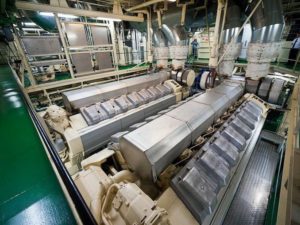 It’s task is training for the maintenance and servicing of ship power plants, as well as the repair of mechanical and electrical equipment. As a graduate of the Faculty of Mechanical Engineering, you will become a valuable worker as an Officer Mechanic, a specialist in the technical control services of valves and production facilities. In the world labor market, there is an increase in demand for technical specialists of engineers who are ready to work in the most difficult conditions.
It’s task is training for the maintenance and servicing of ship power plants, as well as the repair of mechanical and electrical equipment. As a graduate of the Faculty of Mechanical Engineering, you will become a valuable worker as an Officer Mechanic, a specialist in the technical control services of valves and production facilities. In the world labor market, there is an increase in demand for technical specialists of engineers who are ready to work in the most difficult conditions.
Faculty of transport
Candidates for admission are accepted for referral, and the choice of specialty education will appear in the second year of study
Day departments of the first degree (engineering)
DIRECTION: TRANSPORT
3.5 year study in specialties:
– transport system management in Europe (ZSTwE)
– operation of ports and navy (EPiFM)
– river transport (ŻŚ)
– integrated transport logistics (LTZ)
– transport insurance (UT)
– environmental management (E)
DIRECTION: LOGISTICS
3.5 year study in specialties:
– logistics of enterprises (LP)
– logistics and management in the European transport system (LiZwEST)
– Informatics in Logistics (IwL)
DIRECTION: PRODUCT MANAGEMENT AND ENGINEERING
3.5 year study in specialties:
– quality management of products and services (ZJPiU)
– management of innovations in products and services (ZiWPiU)
– security systems in products and services (SBwPiU)
– product information management systems (ISZP)
– management of industrial energy systems (ZPSE)
Day department of the second degree (master’s)
DIRECTION: PRODUCT MANAGEMENT AND ENGINEERING
1.5 year training in specialties:
– logistics and management in the European transport system (LiZwEST)
– Maritime Management
– training is conducted in English
DIRECTION: TRANSPORT
1.5 year training in the specialty:
– integrated transport systems (STZ)
First degree correspondence (engineering)
DIRECTION: TRANSPORT
3.5 year study in specialties:
– transport system management in Europe (ZSTwE)
– river transport (ŻŚ)
– integrated transport logistics (LTZ)
– transport insurance (UT) – environmental (E)
DIRECTION: LOGISTICS
3.5 year study in specialties:
– logistics of enterprises (LP) (13) I kolumna od lewej
– logistics and management in the European transport system (LiZwEST)
– Informatics in Logistics (IwL)
DIRECTION: PRODUCT MANAGEMENT AND ENGINEERING
3.5 year study in specialties:
– quality management of products and services (ZJPiU)
– management of innovations in products and services (ZiWPiU)
– security systems in products and services (SBwPiU)
– product information management systems (ISZP)
– management of industrial energy systems (ZPSE)
Correspondence offices of the second degree (master’s)
DIRECTION: TRANSPORT
1.5 year training in the specialty:
– integrated transport systems (STZ)
DIRECTION: PRODUCT MANAGEMENT AND ENGINEERING
1.5 year training in the specialty:
– logistics and management in the European transport system (LiZwEST)
What can you do as a graduate of the Faculty of Engineering and Transport?
Direction of product management and engineering
A graduate in management and engineering of products is prepared to perform managerial and executive functions at production and service enterprises of the TSL sector (transport, freight forwarding, logistics), with particular consideration of marine enterprises).
He has the ability to determine optimal strategic and operational goals, as well as the effective organization, coordination and control of certain production and service tasks when using modern information technologies. It is prepared for the management of logistics processes in the European transport system and the management of integrated transport. He has knowledge of entrepreneurship, the legal rules for conducting business, the ethics of management and the social responsibility of enterprises in the global economy. He uses knowledge from the field of management and engineering of products obtained in scientific laboratories equipped with appropriate computer programs, as well as on domestic and foreign internships. Fluently uses professional English. It has the ability to acquire language certificates.
Direction of transport
– traffic engineering,
– vehicle engineering,
– analysis of transport systems,
– management of operational processes,
– transport logistics.
They are specialists in the field of modern cargo transportation, operation of integrated transport terminals and logistics centers, as well as the organization of the management of the transport chain “house-house”. In professional work, they can use information technology. They are prepared for work in senior positions in the operational and design and engineering departments of transport, logistics and transport economics in institutions related to the general concept of transport. Freely use professional English. Have the ability to purchase language certificates.
Direction Logistics
A graduate in this field is professionally prepared to make the best decisions in the field of personnel, finance and information management in the enterprise.
He uses the skills of diagnostics, problem solving, monitoring of economic (including transport) processes, as well as the design of production and transport processes. It makes strategic and operational decisions in the field of the operation and development of the enterprise in a competitive environment and changing internal and external situations. He uses competencies that allow him to work in various domestic and international enterprises, as well as in his own firms (especially in enterprises from the TSL industry). He can be employed as a logistics specialist in an enterprise, a TSL field operator, a designer and consultant in logistics, transport and transport economics, an expert in logistics in economic and administrative departments. He is proficient in foreign languages, especially English, knows logistical and transport terminology, and also knows how to use information tools in the logistics management of an enterprise.
Its task is the training of management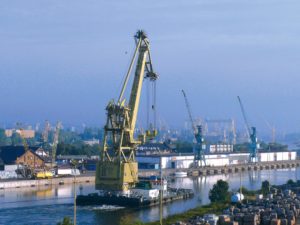 supervisory personnel, as well as those involved in the provision and forwarding (delivery). These skills are necessary when conducting each activity. A modern and enterprising person who wants to occupy a high position in a firm must possess the knowledge acquired at this faculty.
supervisory personnel, as well as those involved in the provision and forwarding (delivery). These skills are necessary when conducting each activity. A modern and enterprising person who wants to occupy a high position in a firm must possess the knowledge acquired at this faculty.
Graduates of the Maritime Academy are responsible people who speak good English and have modern technical knowledge.
Cost of education:
The cost of education for Ukrainians who do not have Polish roots: all “sea” specialties – 9000 zł / year (2100 euro / year), not “sea” specialties – 8000 zł / year (1900 euro / year.)
Any questions?
Ask a question or sign up for a free consultation!


 Русский
Русский Українська
Українська